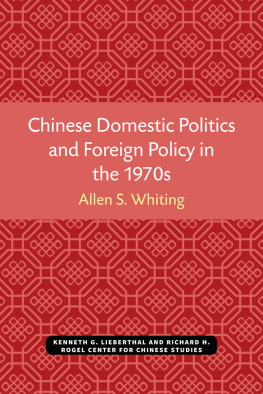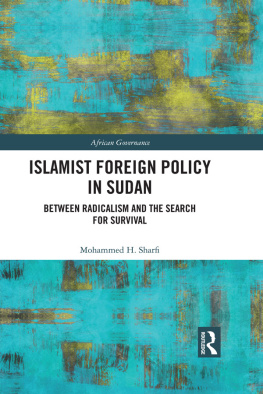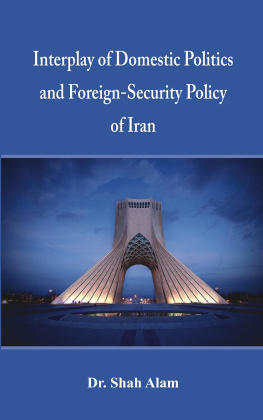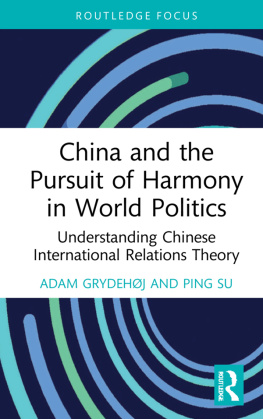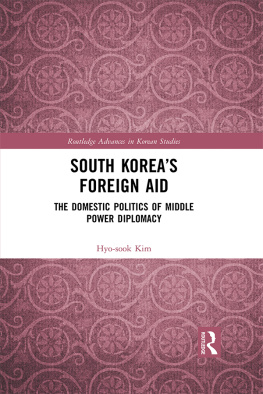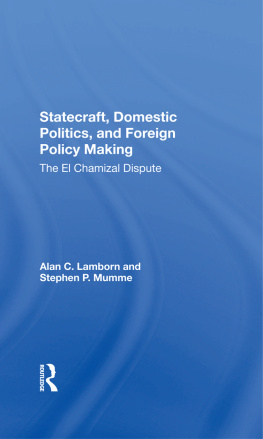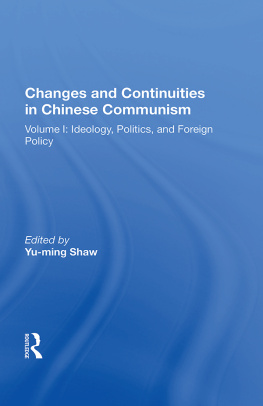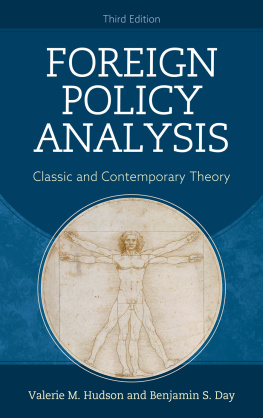Allen S. Whiting - Chinese Domestic Politics and Foreign Policy in the 1970s
Here you can read online Allen S. Whiting - Chinese Domestic Politics and Foreign Policy in the 1970s full text of the book (entire story) in english for free. Download pdf and epub, get meaning, cover and reviews about this ebook. year: 2020, publisher: Kenneth G. Lieberthal and Richard H. Rogel Center for Chinese Studies, genre: Politics. Description of the work, (preface) as well as reviews are available. Best literature library LitArk.com created for fans of good reading and offers a wide selection of genres:
Romance novel
Science fiction
Adventure
Detective
Science
History
Home and family
Prose
Art
Politics
Computer
Non-fiction
Religion
Business
Children
Humor
Choose a favorite category and find really read worthwhile books. Enjoy immersion in the world of imagination, feel the emotions of the characters or learn something new for yourself, make an fascinating discovery.
- Book:Chinese Domestic Politics and Foreign Policy in the 1970s
- Author:
- Publisher:Kenneth G. Lieberthal and Richard H. Rogel Center for Chinese Studies
- Genre:
- Year:2020
- Rating:4 / 5
- Favourites:Add to favourites
- Your mark:
- 80
- 1
- 2
- 3
- 4
- 5
Chinese Domestic Politics and Foreign Policy in the 1970s: summary, description and annotation
We offer to read an annotation, description, summary or preface (depends on what the author of the book "Chinese Domestic Politics and Foreign Policy in the 1970s" wrote himself). If you haven't found the necessary information about the book — write in the comments, we will try to find it.
Chinese Domestic Politics and Foreign Policy in the 1970s — read online for free the complete book (whole text) full work
Below is the text of the book, divided by pages. System saving the place of the last page read, allows you to conveniently read the book "Chinese Domestic Politics and Foreign Policy in the 1970s" online for free, without having to search again every time where you left off. Put a bookmark, and you can go to the page where you finished reading at any time.
Font size:
Interval:
Bookmark:

THE UNIVERSITY OF MICHIGAN CENTER FOR CHINESE STUDIES
MICHIGAN PAPERS IN CHINESE STUDIES
NO. 36
CHINESE DOMESTIC POLITICS AND FOREIGN POLICY IN THE 1970s
by
Allen S. Whiting
Ann Arbor
Center for Chinese Studies
The University of Michigan
1979
Open access edition funded by the National Endowment for the Humanities/Andrew W. Mellon Foundation Humanities Open Book Program.
Copyright 1979
by
Center for Chinese Studies
The University of Michigan
Library of Congress Cataloging in Publication Data
Whiting, Allen Suess, 1926
Chinese domestic politics and foreign policy in the 1970s.
(Michigan papers in Chinese studies; no. 36)
CONTENTS: Introduction.PRC media images of the
U.S. and Taiwan, January-April 1976 and 1977.Domestic politics and foreign trade in the PRC, 1971-1976.
1. ChinaPolitics and government1949-1976. 2. Mass mediaPolitical aspectsChina. I. Title. II. Series.
DS777.55.W443 320.95105 78-31865
ISBN 0-89264-036-7
Printed in the United States of America
ISBN 978-0-89264-036-2 (paper)
ISBN 978-0-472-12785-6 (ebook)
ISBN 978-0-472-90181-4 (open access)
The text of this book is licensed under a Creative Commons Attribution-NonCommercial-NoDerivatives 4.0 International License: https://creativecommons.org/licenses/by-nc-nd/4.0/
CONTENTS
These two studies explore the question of linkage between domestic politics in the Peoples Republic of China (PRC) and Pekings foreign policy.
Much of the analytical problem, however, lies in the dearth of pertinent evidence. Although refugee interviews in Hong Kong throw considerable light on a wide range of domestic issues, they have proven to be of little use for research on foreign affairs.
Unfortunately, such materials on PRC foreign policy as have been disseminated from Taiwan do not stand up to close scrutiny as uniformly authentic and reliable.
These circumstances limit but do not prevent the systematic examination of Pekings foreign policy, at least selected aspects thereof. One fruitful avenue of research lies in content analysis, quantitative and qualitative, of the media. In view of the Gangs control of the media, the hypothesis arose that as between the factions ascendancy in 1976 and its demise in 1977, the media would show a change in imagery dealing with the United States and with the Taiwan issue. On both matters this would move from negative to positive so far as the implications for detente were concerned. However, the opposite trend actually emerged in a rigorous comparison of Peoples Daily ( Jen-min Jih-pao, hereafter JMJP) articles and monitored broadcasts for the period January-Apr il of each year.
In the second study, the radicals stress on self-reliance and the factions nativistic emphasis in cultural affairs were widely assumed to underlay allegorical articles attacking the importation of whole plants and foreign technology. This assumption gained credence in detailed denunciation of the Gangs activities in this regard after its fall in October 1976. But this left unclear what effect such criticism had. On one hand, the actual contracts signed for major imports burgeoned from $58 million in 1972 to $1.2 billion in 1973 and then fell to $364 million in 1975 and $185 million in 1976.
On the other hand, a careful tracing of the ebb and flow as well as the content of press attacks against reliance on foreign technology between 1971 and 1976 showed no correlation with the timing of policy decision and implementation or any relevance to the economic pitfalls of the program. Instead, the media campaign began in 1974, after the program had peaked. It made no reference to the unanticipated problems associated with inflated import prices and shrinking export markets which resulted from the 1973 OPEC (Organization of Petroleum Exporting Countries) oil embargo and price increases. This suggested the determining factor to have been the state of politics in Peking and more specifically the physical state of Chou En-lai, rather than the economics of Chinas foreign trade.
Both studies show the danger of simplistic or impressionistic assumptions which link domestic politics with foreign policy. The lines of division between factions are not continuously drawn across all issue areas nor are they constant across time. Moreover, policy can be reactive to various stimuli, varying in the output according to context as well as to factional politics. These stimuli may be internal and stem from changes in the balance of power among individuals, factions, and coalitions, encouraging an attack or debate at one time and inhibiting it at another. They may also be external, wherein the march of events or probes by foreign sources invite or compel a response that otherwise might not occur.
Content analysis is more helpful for identifying the existence and range of debate than for explaining its cause or consequence. The editorial board of JMJP was changed twice between 1966 and 1977; the director of New China News Agency ( Hsinhua, hereafter NCNA) was replaced twice. These developments suggest that some autonomy is given to such groups and individuals. At least they are held responsible post facto for the content of their organizations output. Precisely how much central control exists over Chinese media is unknown but presumably it too varies over time and across issue area. Therefore, the existence of a line or divergencies therefrom must be placed in context to be properly evaluated for inferring top leadership perceptions, decisions, and goals.
Even when JMJP is directed from the center, it would be fallacious to assume that it accurately reflects leadership opinion. Foreign news may be deliberately distorted for several reasons. An external enemy may be exploited so as to spur domestic unity. It may be exaggerated as a threat in order to mobilize the masses for greater productivity. Foreign friends may be enlarged upon to instill confidence in Chinas international status. Insurgencies and liberation movements may be featured to heighten ideological credibility. A particular country may be shown in an uncritical light because its leadership is visiting Peking. In some instances, JMJP may be used as a medium of communication with foreign governments on the correct assumption that they analyze its contents for inferring PRC policy.
In addition to these various motivations for publishing material which may not correspond with the actual views of PRC decision makers, much information is withheld from the national media. Besides the omission of material at variance with the ideological tenets of Marxism-Leninism, three notable instances of foreign affairs reporting in crisis situations demonstrate the deliberate suppression of policy-relevant news in the media. In September 1950, JMJP sharply reduced its coverage of the Korean War precisely when PRC concern over the intentions of General Douglas MacArthur provoked diplomatic efforts at deterring a United Nations entry into North Korea and military deployments began prior to Chinese intervention. In the spring of 1962, no information appeared in JMJP reflecting apprehension over perceived indicators of a Chinese nationalist intent to invade the mainland after three years of PRC economic disorders. However, on 23 June, NCNA offered a detailed recapitulation of these indicators, immediately after a diplomatic demarche was made to the United States through an ambassadorial meeting at Warsaw. Again in the summer of 1962, Chinese media carried nothing to reveal tension with the Soviet Union over the border province of Sinkiang. Yet, Peking subsequently officially charged Moscow with trying to detach the area by encouraging a mass exodus of non-Chinese peoples and inciting riots in a major city.
Font size:
Interval:
Bookmark:
Similar books «Chinese Domestic Politics and Foreign Policy in the 1970s»
Look at similar books to Chinese Domestic Politics and Foreign Policy in the 1970s. We have selected literature similar in name and meaning in the hope of providing readers with more options to find new, interesting, not yet read works.
Discussion, reviews of the book Chinese Domestic Politics and Foreign Policy in the 1970s and just readers' own opinions. Leave your comments, write what you think about the work, its meaning or the main characters. Specify what exactly you liked and what you didn't like, and why you think so.

